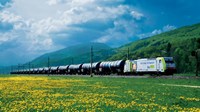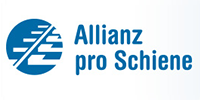
Climate experts are never happy when talk turns to the transport sector, which is now associated with terms such as ‘climate sinner’ or ‘problem child’. Whereas heavy industry, manufacturing and energy producers have considerably cut CO2 emissions since 1990, greenhouse gas emissions from the transport sector have not been reduced over the same period. The German Pro-Rail Alliance decided therefore to invite important rail sector stakeholders to Berlin on Friday for discussions on modal shift strategies. In order to find out what the railways in Germany and Europe can do for the climate after the Paris summit, 180 representatives from the rail sector gathered at the Federal Environment Ministry for the launch of the dialogue project ‘More Climate Protection with Rail Transport’, which is being sponsored by the Federal Environment Agency.
Modal shift: “Targets exist but implementation is slow”
“For years and decades, politicians and society in general have considered it beyond dispute that more transport needs to be shifted from the roads to the railways,” said the managing director of the Pro-Rail Alliance, Dirk Flege, at the project's kick-off conference at the Federal Environment Ministry. “Countless experts and studies have shown that modal shift would make economic sense as well as being good for the climate. What we are lacking is not targets but practical implementation,” said Flege. On behalf of the Environment Agency, the ‘climate dialogue’ intends to find solutions for these deficiencies and deliver strategies for a sustainable modal shift. “We need a dual approach: political support and practical progress. Our contribution is to get the movers and shakers around the table so that businesses and politicians can get to grips with this issue on an interdepartmental, cross-company basis.”
Flege referred to current Environment Agency studies on freight transport. “The experts’ conclusion is that modal shift is not wishful thinking but that rail freight in Germany has real potential.” For passenger transport, it was the people themselves who wanted alternative modes of transport. “A trend towards public transport, more cycling and pedestrian-friendly towns is taking place in metropolitan areas,” said Flege. “Citizens want a transport turn-around and politicians must follow suit.”
BASF wants better conditions for the railways
“BASF prefers to use environmentally friendly transport modes, which means rail and the inland waterways,” said the chemical company’s vice president with responsibily for rail transport, Thorsten Bieker. “At our location in Ludwigshafen over two thirds of freight volume is transported by these two modes of transport. However, in order to increase rail freight’s share of transport volume it must become more competitive,” said Bieker. “From a shipper’s point of view that will only be possible if innovations in rail transport and freight trains are introduced more quickly, the cost of the licencing process is reduced and infrastructure is upgraded to enable the use of longer trains. This is where politicians are called upon to create the necessary framework conditions.”
Zippel laments price gap between road and rail
"As a freight forwarder it is up to me how I transport goods,” said Axel Kröger, CEO and shareholder of Konrad Zippel. “In a direct comparison of rail and road, Konrad Zippel transports 70 percent of freight by train.” However, the economic conditions are currently very unfavourable for rail freight transport. “Reduced road tolls on trucks and the low cost of diesel are giving road transport a boost,” said Kröger. “And precisely because climate concerns mean politicians need to make more use of rail freight transport, a considerable reduction in track access charges is now a matter of urgency.”
VBB wants more backing for e-mobility
“The railways are already a prime example of a functioning electric transport system. E-mobility, something politicians still have to have to get up and running on the roads, is already a fact of life for public transport,” said Susanne Henckel, managing director of the VBB Berlin-Brandenburg transport association. “However, we are still far from satisfied with our overall share of electric traction, which is currently 80 percent for local transport.” Henckel made a plea for the electrification of additional routes. “We can also envisage using innovative vehicles in the near future that do not require overhead cables,” said Henckel.
About Allianz pro Schiene
Allianz pro Schiene e.V. (The Pro-Rail Alliance) is the German alliance for the promotion of environmentally friendly and safe rail transport. It is an independent umbrella organisation that unites non-profit organisations and the commercial sector for the purpose of lobbying on behalf of the railways.




Comments
There are no comments yet for this item
Join the discussion